
Tippecanoe and Tyler too
Encyclopedia

Campaign song
Campaign songs are partisan ditties used in American political canvasses and more especially in presidential contests. The words were commonly set to established melodies like "Yankee Doodle," "Hail, Columbia," "Rosin the Bow," "Hail to the Chief" "John Brown's Body," "Dixie" and "O Tannenbaum" ;...
of the Whig Party
Whig Party (United States)
The Whig Party was a political party of the United States during the era of Jacksonian democracy. Considered integral to the Second Party System and operating from the early 1830s to the mid-1850s, the party was formed in opposition to the policies of President Andrew Jackson and his Democratic...
's colorful Log Cabin Campaign in the 1840 United States presidential election
United States presidential election, 1840
The United States presidential election of 1840 saw President Martin Van Buren fight for re-election against an economic depression and a Whig Party unified for the first time behind war hero William Henry Harrison and his "log cabin campaign"...
. Its lyrics sang the praises of Whig
Whig Party (United States)
The Whig Party was a political party of the United States during the era of Jacksonian democracy. Considered integral to the Second Party System and operating from the early 1830s to the mid-1850s, the party was formed in opposition to the policies of President Andrew Jackson and his Democratic...
candidates William Henry Harrison
William Henry Harrison
William Henry Harrison was the ninth President of the United States , an American military officer and politician, and the first president to die in office. He was 68 years, 23 days old when elected, the oldest president elected until Ronald Reagan in 1980, and last President to be born before the...
(the "hero of Tippecanoe
Battle of Tippecanoe
The Battle of Tippecanoe was fought on November 7, 1811, between United States forces led by Governor William Henry Harrison of the Indiana Territory and Native American warriors associated with the Shawnee leader Tecumseh. Tecumseh and his brother Tenskwatawa were leaders of a confederacy of...
") and John Tyler
John Tyler
John Tyler was the tenth President of the United States . A native of Virginia, Tyler served as a state legislator, governor, U.S. representative, and U.S. senator before being elected Vice President . He was the first to succeed to the office of President following the death of a predecessor...
, while denigrating incumbent Democrat Martin Van Buren
Martin Van Buren
Martin Van Buren was the eighth President of the United States . Before his presidency, he was the eighth Vice President and the tenth Secretary of State, under Andrew Jackson ....
.
Irwin Silber
Irwin Silber
Irwin Silber was an American journalist, editor, publisher, and political activist.-Early years:Irwin Silber was born October 17, 1925 in New York City to ethnic Jewish parents....
, the leading authority on the genre, has written that the song "firmly established the power of singing as a campaign device" in the United States, and that this and the other songs of 1840 represent a "Great Divide" in the development of American campaign music. The North American Review
North American Review
The North American Review was the first literary magazine in the United States. Founded in Boston in 1815 by journalist Nathan Hale and others, it was published continuously until 1940, when publication was suspended due to J. H. Smyth, who had purchased the magazine, being unmasked as a Japanese...
at the time even remarked that the song was, "in the political canvas of 1840 what the 'Marseillaise
La Marseillaise
"La Marseillaise" is the national anthem of France. The song, originally titled "Chant de guerre pour l'Armée du Rhin" was written and composed by Claude Joseph Rouget de Lisle in 1792. The French National Convention adopted it as the Republic's anthem in 1795...
' was to the French Revolution. It sang Harrison into the presidency."
Today, however, the slogan
Slogan
A slogan is a memorable motto or phrase used in a political, commercial, religious and other context as a repetitive expression of an idea or purpose. The word slogan is derived from slogorn which was an Anglicisation of the Scottish Gaelic sluagh-ghairm . Slogans vary from the written and the...
Tippecanoe and Tyler too is better remembered than the song itself—serving as a staple of American schoolbook history.
Origin

Zanesville, Ohio
Zanesville is a city in and the county seat of Muskingum County, Ohio, United States. The population was 25,586 at the 2000 census.Zanesville was named after Ebenezer Zane, who had constructed Zane's Trace, a pioneer road through present-day Ohio...
in 1840, to the music of the minstrelsy
Minstrel show
The minstrel show, or minstrelsy, was an American entertainment consisting of comic skits, variety acts, dancing, and music, performed by white people in blackface or, especially after the Civil War, black people in blackface....
song, "Little Pigs". He first performed it at a Whig meeting in Zanesville, and it came to national attention when, traveling on a business trip, he introduced it to a Whig rally in New York. Ross apparently never copyrighted the song.
"Little Pigs" itself is not well documented, but the available evidence suggests that there was a substantial adaptation of the score for "Tip and Ty".
A historical society in Madison, Wisconsin has asserted in a Capital Times column and apparently in a book as well, that a local young nephew of future U.S. Supreme Court justice Levi Woodbury
Levi Woodbury
Levi Woodbury was an Associate Justice of the Supreme Court of the United States, a U.S. Senator, Governor of New Hampshire and cabinet member in three administrations. He was the first Justice to have attended law school....
wrote the first verses, and that its premiere performance at a Whig rally came at the suggestion of Levi Woodbury. Levi Woodbury was however by all accounts a Democrat, not a Whig, and was in fact serving as Secretary of the Treasury under Martin Van Buren at the time.
There were many variations on the song published at the time, especially ones with new verses. It has been called a "satirical, expandable text that permitted, nay urged, singers to add their own lines".
Lyrics
Ross's version has twelve verses and a rousing chorus. There is repeated reference to rolling balls and constant motion, and rolling "great canvas balls" became a physical prop in the campaign pageantry, alongside the better-known log cabins and hard cider barrels.The song's appeal has been compared to that of a great pop novelty song
Novelty song
A novelty song is a comical or nonsensical song, performed principally for its comical effect. Humorous songs, or those containing humorous elements, are not necessarily novelty songs. The term arose in Tin Pan Alley to describe one of the major divisions of popular music. The other two divisions...
, as against the relative seriousness of most campaign songs.
Martin Van Buren is derided as "Little Van" and "Little Matty" and his supporters as "Vanjacks". These are contrasted with the rustic virtues of Harrison and the inevitability of his victory throughout the states.
The refrain For Tippecanoe and Tyler too is highly euphonious
Euphony
Phonaesthetics is the claim or study of inherent pleasantness or beauty or unpleasantness of the sound of certain words and sentences. Poetry is considered euphonic, as is well-crafted literary prose...
: it exhibits a triple alliteration
Alliteration
In language, alliteration refers to the repetition of a particular sound in the first syllables of Three or more words or phrases. Alliteration has historically developed largely through poetry, in which it more narrowly refers to the repetition of a consonant in any syllables that, according to...
, an internal rhyme
Internal rhyme
In poetry, internal rhyme, or middle rhyme, is rhyme that occurs in a single line of verse.Internal rhyme occurs in the middle of a line, as exemplified by Coleridge, "In mist or cloud, on mast or shroud" or "Whiles all the night through fog-smoke white," in "The Rime of the Ancient Mariner." ...
, and nearly forms an iambic tetrameter
Iambic tetrameter
Iambic tetrameter is a meter in poetry. It refers to a line consisting of four iambic feet. The word "tetrameter" simply means that there are four feet in the line; iambic tetrameter is a line comprising four iambs...
.
Modern recordings
The song was part of the 1968 Off-BroadwayOff-Broadway
Off-Broadway theater is a term for a professional venue in New York City with a seating capacity between 100 and 499, and for a specific production of a play, musical or revue that appears in such a venue, and which adheres to related trade union and other contracts...
musical How to Steal an Election and its cast album, with music and lyrics adapted by folk singer Oscar Brand
Oscar Brand
Oscar Brand is a folk singer, songwriter, and author. In his career, spanning over 60 years, he has composed at least 300 songs and released nearly 100 albums, among them Canadian and American patriotic songs...
.
The song has been recorded in a traditional form at least twice; in 1978 by Peter Janovsky on the album Winners and Losers: Campaign Songs from the Critical Elections in American History, Vol. 1 for Folkways Records
Folkways Records
Folkways Records was a record label founded by Moses Asch that documented folk, world, and children's music. It was acquired by the Smithsonian Institution in 1987, and is now part of Smithsonian Folkways.-History:...
, and in 1999 by Oscar Brand on the album Presidential Campaign Songs: 1789 - 1996 for Smithsonian Folkways Recordings, the successor label to Folkways Records.
The band They Might Be Giants
They Might Be Giants
They Might Be Giants is an American alternative rock band formed in 1982 by John Flansburgh and John Linnell. During TMBG's early years Flansburgh and Linnell were frequently accompanied by a drum machine. In the early 1990s, TMBG became a full band. Currently, the members of TMBG are...
recorded an alternative rock version of the song for the 2004 compilation album Future Soundtrack for America
Future Soundtrack for America
-External links:**, the companion book from McSweeney's...
, using a three verse lyric as adapted by Oscar Brand (from the first, eighth and second verses in Ross's original). It was also released to their December 2004 album Venue Songs
Venue Songs
Venue Songs is a 2004 album by the group They Might Be Giants. Although technically it is a live album, as all the tracks were performed live, it is different than a standard live album in that, instead of live versions of the band's popular songs, it is composed of all new songs...
. Appropriately enough, the compilation was a benefit album for political causes relating to that year's election. John Flansburgh of They Might be Giants has remarked on the song's historical success as "the 'Rock Around the Clock
Rock Around the Clock
"Rock Around the Clock" is a 12-bar-blues-based song written by Max C. Freedman and James E. Myers in 1952. The best-known and most successful rendition was recorded by Bill Haley and His Comets in 1954...
' of campaign songs" and "the 'I Want to Hold Your Hand
I Want to Hold Your Hand
"I Want to Hold Your Hand" is a song by the English rock band The Beatles. Written by John Lennon and Paul McCartney, and recorded in October 1963, it was the first Beatles record to be made using four-track equipment....
' of campaign songs."

